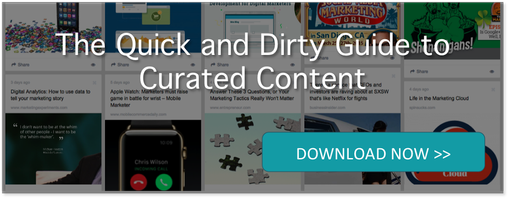
Last week, we had the opportunity to co-host a meetup with Roojoom called “Content Marketing: From Psychology to Strategy.” During the event, we heard from two incredibly interesting and distinct speakers from the marketing world.
While the first half of the evening focused on the psychological triggers behind content creation, the second was a practical introduction to targeting audiences with personalized website messaging.
Jonathan Gabay, who spoke first, is a recognized author, brand psychologist, and award-winning copywriter hailing from the UK. The second speaker, David Myers, is a web engagement and real-time personalization expert at Marketo, with over a decade of experience providing marketing solutions to B2Bs and B2Cs globally.
Below is a glance at the takeaways and slides from by each speaker, and how to integrate their recommendations into your content marketing strategy.
Jonathan Gabay: Your Brain on Content Marketing
Jonathan took a deep-dive into the role that psychology plays in our B2B content development, with an emphasis on the latest marketing buzzword: storytelling.
Before creating a piece of content, he suggests taking a minute to think about it as a novel – in other words, every compelling business story needs protagonists.
Which cast of “characters” should you consider before writing?
- Sellers
- Buyers
- Channels
- Stakeholders
Once you identify which character you’re writing for, the next step is to cure that audience’s pain points. Regardless of whether you’re writing a blog post, white paper, eBook, or even presenting a webinar, your content must focus on helping prospects overcome pain points they can easily relate to.
Apart from this guideline, Jonathan highlighted 4 other best practices to follow when creating B2B content, including:
- Start off by introducing the problem or pain point to your readers
- Discuss the issues and context surrounding this trigger
- Offer at least one (but preferably more) solutions to overcome it
- Explain the outcome and benefit of implementing these solutions
The purpose of these recommendations is to build up trust and credibility with your audience, primarily by catering to their needs via your content. During his talk, Jonathan likened this to Maslow’s famous Hierarchy of Needs pyramid, and showed a version in which the base of the “brand psychology” pyramid, is belief, while the other levels include trust, faith, and hope.
This ties into another great insight he offered, which is to trash USPs (unique selling proposition) in favor of PODs (point of difference). While a USP is the way in which you sell your product by telling customers how it’s unique, a POD is the specific factor that defines your product’s uniqueness.
A POD is basically the competitive advantage your product or service has over its competitors, and how that makes it stand out from the crowd. For any company just starting out, begin by choosing one feature and its benefit, and remember that from a psychological point of view, it needs to link back to your customer’s needs and desires better than that of your competitors.
David Myers: The Future of Marketing Lies in Personalization
On average, we’re inundated with a tremendous number of marketing messages per day – whether it’s on our commute to work, when checking Facebook, or during our favorite TV show. With this deluge of companies vying for our attention – how can we, as marketers, differentiate our brand?
That’s exactly what David Myers’ presentation on website personalization and nurturing was all about. David spoke about how a company’s website receives more visitor volume than any other channel – social media, emails, etc., but despite this, marketers fail to customize their content for prospective visitors.
How important is your website? Well, it turns out that 83% of B2B buyers say company websites are the most popular channel for their online research. Each visitor comes from a different industry, demographic, and location, so why should we treat them exactly the same?
Rather than have one default for website content, with the same messaging, visuals, and offers, wouldn’t it be that much smarter to customize all of this content, based on each and every prospect’s unique data?
To make the connection between content marketing and target audiences, David spoke about implementing real-time website personalization. This technology analyzes a host of attributes, and in turn, presents each visitor with the content that he or she is most likely to engage with.
Here are a few examples of B2B website personalization attributes:
- Organization
- Industry
- Revenue
- Buyer Journey
- Company Size
- Persona
- Territory
For example, if you choose to focus on industry, you can start building up content assets based on the industries you choose. If you know that a website visitor is from the financial industry, you can use personalization to show him or her a case study on a bank your company worked with, instead of the default option.
During his presentation, David emphasized the need to map out the buyer’s journey, and understand which types of content to show your visitors at each stage. If a prospect is anonymous, or has only visited your website one or two times, it makes more sense to show that person an infographic, or even an introductory video, than a CTA for a live demo or an invite to a user group meetup.
As marketers, we need to fully grasp the idea of our websites as our main channels of interaction with your audience – and a great place for nurturing them. Real-time personalization, according to David, let’s us engage visitors based on who they are, as individuals, and what they do, which in turns helps increase conversion rates.

by The Penguin Team on May 27, 2015
As a leading B2B digital marketing agency, We help B2B Technology Companies, enterprise software, and hardware companies increase brand awareness, reach more qualified leads and close more customers. Penguin Strategies is a Diamond Partner of HubSpot.






